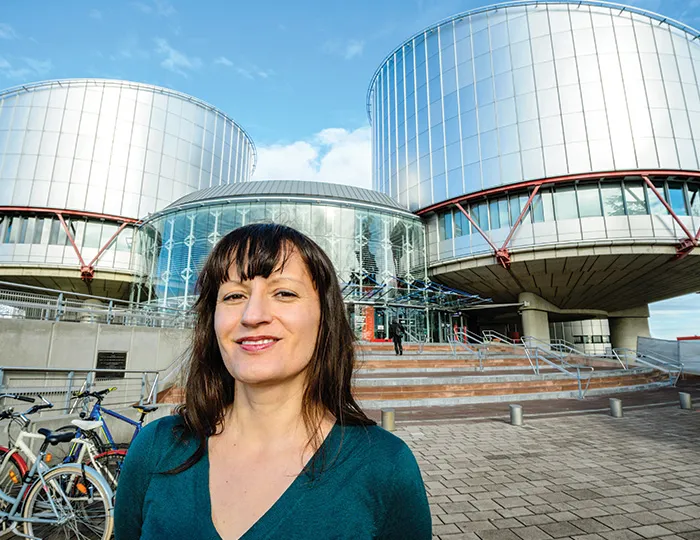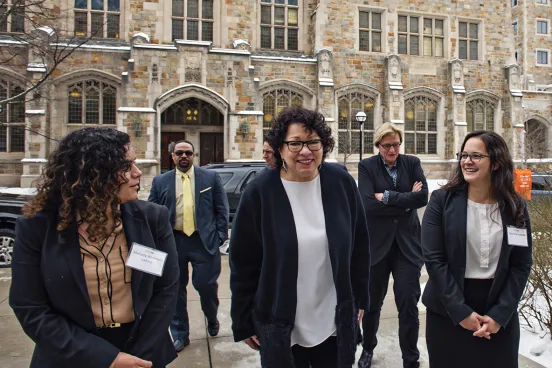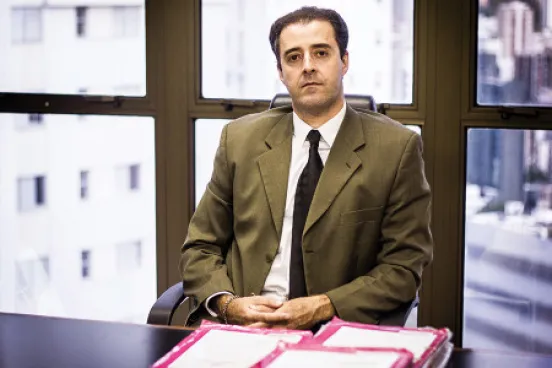
Sometimes Bojana Urumova, ’96, works on high-profile issues with regional or global implications. Sometimes the work simply concerns individuals. But in her line of work, nothing is really simple.
Urumova is deputy to the director in the Office of the Commissioner for Human Rights, a part of the Council of Europe (COE) responsible for fostering the effective observance of the European Convention on Human Rights. Formally known as the Convention for the Protection of Human Rights and Fundamental Freedoms, it protects citizens’ rights to not have their lives taken by a member state, while guaranteeing the right to a fair trial and freedom of expression, outlawing slavery, and other provisions.
The commissioner’s mandate is broad. So Urumova’s work has taken her to the Kremlin for discussions with Russian Prime Minister Dmitry Medvedev about Chechnya, to Finland to discuss the human rights of the indigenous Sámi people, and to many other points across the continent.
“We always are conscious that we’re dealing with political actors, and sometimes it takes a lot of persuasion to convince those actors to take specific steps to respect human rights standards,” Urumova says. “We’re not always successful.”
Urumova’s office is not a judicial body; rather, it relies on awareness-building and persuasion through face-to-face meetings and the media. Commissioner Nils Muižnieks has spoken out repeatedly—including in several New York Times op-eds—about human rights concerns in Europe, including the deterioration of freedoms in Hungary and the migration crisis.
Urumova specializes in the Balkans, Eastern Europe, and Russia and the former Soviet Republics, but as deputy to the director, she is involved with the whole office. Right now, that means a focus on migration-related issues that affect each of the COE’s 47 member states. “We have intervened several times to call attention to problematic legislation that different countries have pursued in the name of security, such as closing borders, turning away asylum seekers, and extending the amount of time that migrant children can be deprived of their liberty,” she says. “If you also take into account Brexit and the coup attempt in Turkey, 2016 was a very eventful year.”
It seems that 2017 will be equally challenging for Urumova and her team. The general election in the Netherlands, presidential election in France, and federal election in Germany have questioned the stability of the European Union, while surges of right-wing nationalism, lingering fiscal uncertainty in Greece, and the ongoing struggle to manage the influx of migrants mean “greater uncertainty about the continent’s future course and our human rights protection system,” Urumova says.
Urumova has fought these challenges from different angles since graduating from Michigan Law. As the daughter of professors, she was born in Moscow but spent a large chunk of her childhood in what was then Yugoslavia. She lived in Ann Arbor for part of her junior high and high school years, in addition to earning a bachelor’s degree and a JD from U-M. When, as a 3L, she saw that the COE was seeking a Macedonian national with a degree from a U.S. law school, she figured it was a sign that her interest in a public service career was going global. “Macedonia was becoming a member of the Council of Europe at about the same time that I took Professor [Brian] Simpson’s seminar on the European Convention on Human Rights. It was a confluence of circumstances that I couldn’t ignore.”
She studied for exams on the flights to and from her interview in Strasbourg, where she still is based. Noting that the COE circa mid-1990s was very different from today, Urumova says a panel of Western European males interviewed her in every Western European language she could speak. “I told them I also spoke Macedonian and Serbo-Croatian, but none of them did.”
During that first visit, Urumova also saw the global power of her U-M network. Hans Christian “Chris” Krueger, ’59, then secretary to the European Commission for Human Rights (and later deputy secretary general of the Council of Europe) gave her encouragement. “He was very gracious and supportive, and wore his maize-and-blue tie when he received me.”
Urumova’s first assignment with the COE was with the Secretariat of the Committee for the Prevention of Torture (CPT). Under the European Convention on the Prevention of Torture, the CPT has authority to visit any place of detention—including prisons, detention facilities for foreigners, and psychiatric hospitals—in any member state for fact-finding purposes. During her tenure, Urumova went on numerous visits throughout Europe, from Turkey to the United Kingdom, visiting places of deprivation of liberty and then writing reports and recommendations about what she observed.
The goal of the visits was not to assess the legality of the deprivation of liberty, but rather the humaneness of the treatment, not only in the current facility but in previous ones. “We also were examining whether officials responsible for abuses were being held to account,” she says.
“Not surprisingly, most ill treatment happened in police custody while officials tried to obtain a confession,” Urumova adds. “The key is to interview people individually—away from guards and other prisoners. During a trip to Ukraine last year with the commissioner for human rights, we interviewed former detainees who had been held captive by either the Ukrainians or the separatists. Their descriptions of ill treatment were remarkably similar, down to details of the methods, facilities, and captors. That’s how you become more certain you’re getting solid information.”
While she has experienced delays and even obstructive behavior on the part of local officials who weren’t aware of the CPT’s mandate, Urumova says she has never been denied access as part of a CPT delegation. She also has witnessed police try to brush off sticks and other quasi-weapons as stolen property or unlabeled evidence. “On subsequent visits, they’re more careful about storing them. Or preferably, they stop using them against the people in their custody.”
After her service with the CPT, Urumova spent three years in Armenia as the special representative of the secretary general of the Council of Europe. As the Council’s chief representative in-country just four years after Armenia joined the COE, Urumova worked with Armenian officials on post-accession commitments, including reforms to the constitution and the electoral code, and helped develop cultural programs. She also was a key source of information about the situation on the ground for the COE and other international entities following Armenia’s presidential election in 2008, when a state of emergency was imposed after police clashed with protesters in downtown Yerevan. “I was at a critical place during a turbulent time, and it was a valuable learning experience,” she says.
When the previous commissioner for human rights, Thomas Hammarberg, visited Armenia during Urumova’s tenure, her leadership caused him to offer her a position on his staff, where she remains with Commissioner Muižnieks. Shortly after she began her new assignment, war broke out in Georgia, later followed by violent events in Ukraine and Russia’s annexation of the Crimea region. “So much for enjoying some peace and quiet after leaving Armenia,” she says.
While the world can often seem anything but peaceful and quiet, Urumova draws inspiration from the dynamic multinational team in the commissioner’s office and from the times that she knows they helped to make a difference. Following the conflict in Georgia, she was part of tense negotiations with South Ossetian leaders to return the bodies of Georgian soldiers. Later, she saw a news story about fallen soldiers returned to their families and given a state burial. “Even though it wasn’t publicly acknowledged, I knew it was thanks to the commissioner’s efforts.”






